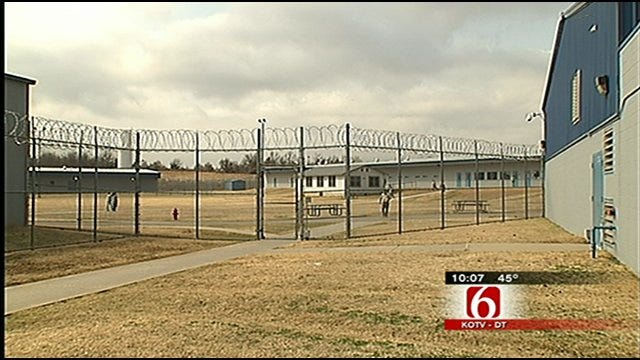Oklahoma Leads The Nation For Women Behind Bars
Oklahoma locks up more women in prison, per capita, than any other state, and your tax dollars are footing the hefty bill.Tuesday, March 8th 2011, 1:05 pm
Amy Lester, Oklahoma Impact Team
OKLAHOMA CITY -- Oklahoma leads the nation for the number of women in prison per capita with 132 out of every 100,000 women behind bars.
"I don't think the women in Oklahoma are any worse than the women in any other part of the country," said Bob Ravitz, Oklahoma County Public Defender.
Ravitz said it's not the women who are the problem, it's the state's sentencing code that's to blame. He said Oklahoma locks women up for crimes that other states only consider misdemeanors. Plus, he said the fines and rules regarding probation make it impossible for women to succeed.
"The answer is to lower punishments, to punish people for a period of time that gets their attention and doesn't give up on the individual," said Ravitz. "The length of time that we're locking up certain women are ridiculous for the types of crimes that they committed."
Over 66 percent of the women in prison are serving sentences for non-violent crimes. Half of them have a drug offense.
Read the Department of Corrections' report on female offenders.
"I think we are over sentenced, you know, for bogus checks and drugs," said Natasha Harmon, inmate at Mabel Bassett Correctional Center.
Harmon is serving 25 years for filing false insurance claims. She also has a 20 year concurrent sentence for conspiracy to commit a felony, obtaining money by false pretense and bogus checks.
"I did do it, so punish me, to an extent," said Harmon. "I do believe the sentence was too harsh for the crime that I committed."
Harmon has three kids. She said they're the true victims of her long sentence.
"I'm suffering, they're suffering. They're suffering because I am removed from them and I am suffering because I'm not there to do what I need to do for them," said Harmon.
Harmon sees her children once a month. The Girl Scouts Beyond Bars program brings them, and other inmates' kids, to the prison. Studies show having a mother in prison has a negative effect on children, leading to depression, problems in school and ultimately, incarceration themselves.
Read the Department of Justice's report on incarceration.
"There are better ways to hold them accountable, protect the public and reduce corrections costs," said Amy Santee, Senior Program Officer, George Kaiser Family Foundation.
The Kaiser Foundation has invested $2.6 million in its Women in Recovery program. This is an alternative to incarceration. Women who face prison time can go through this intense, year long program that provides therapy, parenting skills, sober housing, reunification with children and drug/alcohol treatment.
"I'm learning how to be a good person. I'm giving back to society, other than taking from it," said Andrea Ballard, a Women in Recovery participant.
Ballard said she faced 10 years in prison after being pulled over with several boxes of Sudafed and a small amount of meth. It was her first offense. She has three children and thanks to the program, she now sees them as often as she wants.
"Once I got sober, I realized just how ridiculous I had made my life and how unmanageable I had made my life," Ballard said. "I thank God everyday for this program."
Women in Recovery costs about the same as one year in prison. If this program was more widespread, it could save the state a tremendous amount of cash. That's because these women were going to spend between two and seven years behind bars.
"What we want to try to do is develop a plan that will allow us to be both smart and tough on crime," said Speaker of the House Kris Steele, Republican from Shawnee.
Steele got funding to start a program similar to Women in Recovery, in Oklahoma County, last session. This year, he's going for corrections reform. Steele's bill would make more low risk non-violent offenders eligible for community sentencing and Global Positioning System Monitoring programs. This would save the state approximately $800,000. Plus, his bill limits the Governor's role in the parole process.
"I'm not so sure we can afford, we can continue to go down the road that we're on," said Steele. "It would be great if we could make better use of the taxpayer dollars."
Steele's bill has the House and is heading to the Senate for approval. Steele said, long term, it could save the state millions of dollars.
Read more stories on this topic from our investigative partners, Oklahoma Watch.
This story is, in part, the product of Griffin Communications' (through its Oklahoma Impact Team) partnership with Oklahoma Watch, "a non-profit, investigative and in-depth reporting team that collaborates with other news organizations and higher education to produce journalism that makes a difference in the lives of Oklahomans." Oklahoma Watch's other media partners include The Oklahoman, The Tulsa World, OETA—The Oklahoma Network, and KWGS Public Radio. Oklahoma Watch is funded by the Ethics and Excellence in Journalism Foundation, the George Kaiser Family Foundation, the John S. and James L. Knight Foundation, and the Tulsa Community Foundation.
More Like This
March 8th, 2011
September 29th, 2024
September 17th, 2024
Top Headlines
December 15th, 2024
December 15th, 2024
December 15th, 2024
December 15th, 2024













